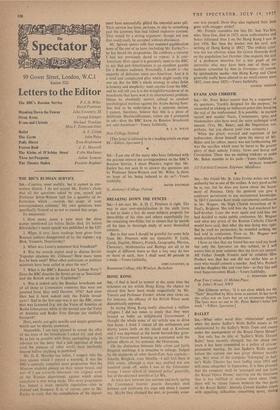Letters to the Editor
The BBC's Russian Service P. J. D. Wiles
David Footman
Breaking Down the Fences John Coventry, SJ Bong Kong George Edinger Evans and Christie Michael Tomkins
Miss F. Tennyson Jesse
Ballet A. V. Colon The Gym John Press Puffs Direct Tom Hopkinson Forrest Reid J. C. Maxwell The Kicins of D'Arblay Street Colin Machines Thou Art Picrpoint Julian Symons The Theatre Stakes Frederic Raphael
THE BBC'S RUSSIAN SERVICE
SIR,—Courtesy must mollify, but it cannot in con- science disarm. I do not accept Mr. Earley's claim that all the questions asked by you, myself and Professor Seton-Watson 'call for a quantity of in- formation which ... exceeds the scope of your correspondence columns.' My own questions were specifically framed so as not to exceed that scope.
To enumerate :
1. How many times a year were the slave camps mentioned ka) before Stalin died, (h) before Khrushchev's secret speech was published in the US?
2. When, if ever, have readings been given from Russian authors disapproved of by the regime ; e.g. Blok, Yessenin, Dostoievsky?
3. When was Lenin's testament first broadcast?
4. Was the outside expert used to discuss Soviet- Yugoslav relations Mr. Zilliacus? How many times has he been used? What other politicians or political scientists have been called in since the war?
5. What is the BBC's Russian for 'Labour Party'? Does the BBC describe the Soviet set-up as 'Socialism' and the British set-up as 'Capitalism'?
6. Was it indeed only the Russian broadcasts out of all those to Communist countries that were not jammed from May until October, 1956? And since then has it been indeed only the Polish broad- casts? And in the first case was it not the BBC alone that was favoured (e.g. not the Voice of America or Radio Liberation); while in the second case the Voice of America and Radio Free Europe are similarly favoured?
Here, surely, are quite specific and simple questions which can be shortly answered.
Meanwhile, I am very pleased to accept the offer of the texts of the brinidcasts I asked for, and shall be as fair as possible with them, apologising only in, advance for the delay that a just appraisal of them (and the pressure of other work) must inevitably impose before anything is published.
Mr. D. E. Maurice has fallen, I suspect, into the trap against which I uttered a warning. It was the BBC's centrally compiled news programme that the Moscow students pinned on their notice board, and riot—if 1 am correctly informed—the original work of the Russian department, against which alone complaint is now being made. This news programme has indeed a most enviable reputation—also in Poland and Hungary. It is, of course, open to Mr. Earley to reply that the compilations of the depart-
ment have successfully gilded the essential news pill. Their service has been, perhaps, to slip in something past the jammers that had indeed explosive content. That would be a strong argument: though not one that could easily be accepted without discussion.
Mr. Spiwak speaks with that essential qualification none of the rest of us have (including Mr. Earley?)— he has heard the programme. He confirms a rumour I had not previously dared to repeat: it is anti- American. Here again it is genuinely open to the BBC to say that anti-Americanism is an excellent gambit for a Russian audience. Personally, I doubt it—the majority of defectors seem pro-American. And it is a bold and complicated ploy which might easily trip one up. But the BBC's whole strategy in other fields is honesty and simplicity: meet anyone from the BBC and he will tell you it is the straightforwardness of its broadcasts that have won it its international position. Hence its absolutely correct refusal to conduct psychological warfare against the Arabs during Suez: that had to be undertaken by a separate station. I cannot, therefore, believe that this is a piece of deliberate Machiavellianism; rather am I prompted to ask—does the BBC know its Russian broadcasts are anti-American?—Yours faithfully, [This letter is referred to in a leading article•on page 80.—Editor, Spectator.]
•














































 Previous page
Previous page